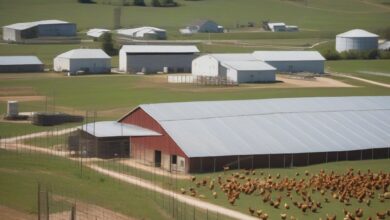Bird Flu Outbreak Confirmed in Oakland County Backyard Flock
Bird Flu Outbreak Confirmed in Oakland County Backyard Flock
The recent discovery of a bird flu outbreak in Oakland County has raised significant concerns among poultry owners and public health officials. This unfortunate development has the potential to impact not only local backyard flocks but also the broader agricultural community and even public health. As we delve into the details of this outbreak, we’ll explore its implications and how to mitigate risks associated with avian influenza.
What is the Bird Flu?
Avian influenza, commonly referred to as bird flu, is a viral infection that primarily affects birds but can also infect other animals and, in rare cases, humans. The virus can manifest in a range of forms — some of which are highly pathogenic, leading to severe disease and high mortality rates in birds, while others are less harmful but still raise health concerns.
Highly Pathogenic Avian Influenza (HPAI)
Among the various strains of avian influenza, the highly pathogenic strains, such as H5N1 and H7N9, are especially dangerous. These variants can lead to significant losses within poultry populations, affecting health, agriculture, and economy.
The Current Situation in Oakland County
The recent outbreak reported by authorities in Oakland County involves a backyard flock. This revelation has prompted health officials to urge local poultry owners to remain vigilant and report any suspicious illnesses within their avian populations. The impact of this outbreak can be significant:
- Increased Testing: The Michigan Department of Agriculture and Rural Development (MDARD) is ramping up testing among domestic birds.
- Quarantine Measures: Areas surrounding affected flocks may undergo quarantine to prevent further spread.
- Public Awareness: Increased awareness and education on best practices for managing backyard flocks.
Symptoms to Watch For
Poultry owners are encouraged to monitor their flocks closely. Symptoms of avian influenza include:
- Sudden death in birds
- Signs of respiratory distress
- Decreased egg production
- Swelling of the head, neck, and eyes
- Unusual neurological signs
Preventative Measures for Backyard Flocks
Given the ongoing concerns and potential for avian influenza to spread, it is crucial for backyard poultry owners to take proactive steps to safeguard their flocks. Here are some recommended practices:
1. Biosecurity Protocols
Establishing strict biosecurity measures is essential in protecting your backyard flock. These protocols include:
- Limiting Access: Restrict access to your flock to essential personnel only.
- Footwear and Clothing: Change footwear and clothing before handling birds and sanitize equipment regularly.
- Control Wildlife: Take measures to minimize contact between your birds and wild birds, as they can be carriers of the virus.
2. Vaccination
Although there is currently limited availability of vaccines for avian influenza for backyard birds in the U.S., stay informed about any potential vaccine options and consult a veterinarian.
3. Monitor and Report
Regularly monitor your flock’s health and report any suspicious symptoms to local authorities immediately. Early detection is vital for managing potential outbreaks.
Public Health Implications
While avian influenza primarily affects birds, there is a potential risk of transmission to humans, although this is rare. Public health officials emphasize the importance of maintaining effective communication and education concerning avian influenza and its risks. Key points include:
- Human Infections: Instances of humans contracting bird flu have been limited, but precautions are essential, especially for those working closely with poultry.
- Food Safety: The Centers for Disease Control and Prevention (CDC) assure that properly cooked poultry products pose no risk of transmission to humans.
- Community Education: Regular community outreach programs can help educate the public on preventing the spread of avian influenza and managing poultry health.
Conclusion
The bird flu outbreak in Oakland County serves as a critical reminder of the need for vigilance within both the poultry community and public health sectors. By understanding the nature of avian influenza, recognizing symptoms, and implementing robust biosecurity measures, backyard flock owners can protect not only their birds but also contribute to the longevity and health of the broader agricultural environment.
Stay informed, stay safe, and ensure that your flock is healthy to prevent any potential spread of this virus in the community.
Stay Updated
For ongoing updates regarding the bird flu situation in Oakland County and recommendations from local authorities, be sure to follow reliable news sources and the Michigan Department of Agriculture and Rural Development’s official channels.
“`



